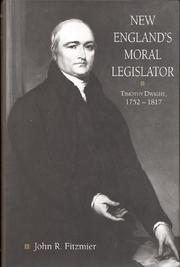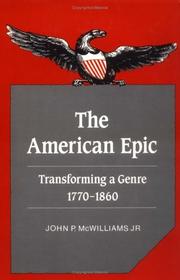| Listing 1 - 10 of 11 | << page >> |
Sort by
|
Book
Year: 1895 Publisher: New York [etc.] Putnam
Abstract | Keywords | Export | Availability | Bookmark
 Loading...
Loading...Choose an application
- Reference Manager
- EndNote
- RefWorks (Direct export to RefWorks)
Book
Year: 1969 Publisher: New York : Twayne Publishers,
Abstract | Keywords | Export | Availability | Bookmark
 Loading...
Loading...Choose an application
- Reference Manager
- EndNote
- RefWorks (Direct export to RefWorks)
Digital
Year: 1817 Publisher: New Haven Maltby, Goldsmith & Co.
Abstract | Keywords | Export | Availability | Bookmark
 Loading...
Loading...Choose an application
- Reference Manager
- EndNote
- RefWorks (Direct export to RefWorks)
Book
Year: 1943 Publisher: Chicago, Ill. : University of Chicago press,
Abstract | Keywords | Export | Availability | Bookmark
 Loading...
Loading...Choose an application
- Reference Manager
- EndNote
- RefWorks (Direct export to RefWorks)
Barlow, Joel, --- Dwight, Timothy, --- Humphreys, David, --- Trumbull, John,
Book
Year: 1943 Publisher: Chicago, Ill., : University of Chicago Press,
Abstract | Keywords | Export | Availability | Bookmark
 Loading...
Loading...Choose an application
- Reference Manager
- EndNote
- RefWorks (Direct export to RefWorks)
American literature --- History and criticism --- Barlow, Joel, --- Dwight, Timothy, --- Humphreys, David, --- Trumbull, John, --- Connecticut --- Intellectual life

ISBN: 9786612079481 0585108544 9780585108544 0253334330 6612079487 Year: 1998 Publisher: Bloomington Indiana University Press
Abstract | Keywords | Export | Availability | Bookmark
 Loading...
Loading...Choose an application
- Reference Manager
- EndNote
- RefWorks (Direct export to RefWorks)
"Grandson of Jonathan Edwards, president of Yale College, writer, teacher, theologian, Timothy Dwight was a major figure in the Second Great Awakening of American Protestantism. He was dubbed by an admirer "the most conspicuous man in New England," but biographers have struggled to comprehend his life. Though a voluminous writer, Dwight left relatively few personal records and his life has been seen, rather as the near-blind Dwight himself saw the world, only dimly, a figure of "lights and shades."" "For John R. Fitzmier, the key to imagining Dwight's life as a whole is to be found in Dwight's religious system, "godly federalism," which unified a seemingly disparate set of views and activities. As background to understanding Dwight and his role in Revolutionary and early national America, Fitzmier begins with a biographical study, based wherever possible on manuscript sources and the observations of contemporaries, as well as on textual evidence drawn from Dwight's writings. In the next three chapters, he treats Dwight as preacher, theologian, and historian. Finally, Fitzmier shows how Dwight's three professional activities became constituents of a larger role - that of moralist. Understanding the ways in which his moralism shaped his vision leads to a fuller appreciation of the "godly federalism" that Dwight created and promulgated from the moral high ground of the Yale presidency."--Jacket.
Congregational churches --- Theologians --- Christianity --- Religion --- Philosophy & Religion --- Christian sects --- Clergy --- Biography --- Dwight, Timothy, --- Inhabitant of New-England, --- Dwight,

ISBN: 0805784500 Year: 1988 Publisher: Boston Twayne Publishers
Abstract | Keywords | Export | Availability | Bookmark
 Loading...
Loading...Choose an application
- Reference Manager
- EndNote
- RefWorks (Direct export to RefWorks)
American poetry --- History and criticism --- Barlow, Joel --- Criticism and interpretation --- Bradstreet, Anne Dudley --- Bryant, William Cullen --- Dwight, Timothy --- Emerson, Ralph Waldo --- Franklin, Benjamin --- Freneau, Philip Morin --- Holmes, Oliver Wendell --- Lanier, Sidney --- Lowell, James Russell --- Melville, Herman --- Poe, Edgar Allan --- Taylor, Edward --- Timrod, Henry --- Irving, Washington --- Wheatley, Phillis --- Whitman, Walt --- Whittier, John Greenleaf --- Wigglesworth, Michael

ISBN: 9781469601083 1469601087 0807827150 9780807827154 0807853836 9780807853832 0807839051 9798890875037 Year: 2002 Publisher: Chapel Hill Published for the Omohundro Institute of Early American History and Culture, Williamsurg, Virginia, by the University of North Carolina Press
Abstract | Keywords | Export | Availability | Bookmark
 Loading...
Loading...Choose an application
- Reference Manager
- EndNote
- RefWorks (Direct export to RefWorks)
Faith in literature. --- Theology in literature. --- Religion in literature. --- Rationalism in literature. --- Belief and doubt in literature. --- Verse satire, American --- Christian poetry, American --- Freethinkers --- Christianity and literature --- Religion in drama --- Religion in poetry --- American verse satire --- American poetry --- Free thinkers --- Rationalists --- Literature and Christianity --- Literature --- Christian literature --- History and criticism. --- History --- Chauncy, Charles, --- Dwight, Timothy, --- In literature. --- T. W., --- W., T., --- Chauncey, Charles,

ISBN: 0521373220 0521107024 0511666632 Year: 1990 Publisher: Cambridge Cambridge University Press
Abstract | Keywords | Export | Availability | Bookmark
 Loading...
Loading...Choose an application
- Reference Manager
- EndNote
- RefWorks (Direct export to RefWorks)
John McWilliams's 1990 book was the first thorough account of the many attempts to fashion an epic literature (the anxiously anticipated 'American Epic') from a wide range of potentially heroic New World subjects. At the outset, McWilliams considers the many problems - cultural, political and literary' - of adapting Enlightenment views of republican progress to a genre that had traditionally celebrated the greatness of warriors. After a survey of the many epic poems written during and after the American Revolution, McWilliams shows how and why the epic had to be transformed from imitative narrative poetry into the new, open genres of prose history (Irving, Prescott and Parkman), fictional romance (Cooper and Melville) and free verse (Whitman). Believing that reviews are an important and slighted agent of literary change, McWilliams has written his book in the form of chronological literary history. His book, however, is no march of dates within tired categories. The American Epic suggests that imaginative writers of the Romantic era were in fact far less proscriptive about the boundaries of literary genre than many a twentieth-century writer and scholar.
Poetry --- Fiction --- American literature --- anno 1800-1899 --- anno 1700-1799 --- Epic literature [American ] --- History and criticism --- Revolutionary period, 1775-1783 --- 1783-1850 --- Barlow, Joel --- Criticism and interpretation --- Cooper, James Fenimore --- Dwight, Timothy --- Melville, Herman --- Prescott, William Hickling --- Simms, William Gilmore --- Trumbull, John --- Whitman, Walt --- Irving, Washington --- Parkman, Francis --- Paulding, James Kirke --- Arts and Humanities --- Literature --- Epic literature, American --- American epic literature --- History and criticism. --- United States --- Intellectual life
Book
ISBN: 0691223688 Year: 2003 Publisher: Oxford : Princeton University Press,
Abstract | Keywords | Export | Availability | Bookmark
 Loading...
Loading...Choose an application
- Reference Manager
- EndNote
- RefWorks (Direct export to RefWorks)
A seminal figure in American literature and philosophy, Ralph Waldo Emerson is considered the apostle of self-reliance, fully alive within his ideas and disarmingly confident about his innermost thoughts. Yet the circumstances around "The American Scholar" oration--his first great public address and the most celebrated talk in American academic history--suggest a different Emerson. In Understanding Emerson, Kenneth Sacks draws on a wealth of contemporary correspondence and diaries, much of it previously unexamined, to reveal a young intellectual struggling to define himself and his principles. Caught up in the fierce dispute between his Transcendentalist colleagues and Harvard, the secular bastion of Boston Unitarianism and the very institution he was invited to honor with the annual Phi Beta Kappa address, Emerson agonized over compromising his sense of self-reliance while simultaneously desiring to meet the expectations of his friends. Putting aside self-doubts and a resistance to controversy, in the end he produced an oration of extraordinary power and authentic vision that propelled him to greater awareness of social justice, set the standard for the role of the intellectual in America, and continues to point the way toward educational reform. In placing this singular event within its social and philosophical context, Sacks opens a window into America's nineteenth-century intellectual landscape as well as documenting the evolution of Emerson's idealism. Engagingly written, this book, which includes the complete text of "The American Scholar," allows us to appreciate fully Emerson's brilliant rebuke of the academy and his insistence that the most important truths derive not from books and observation but from intuition within each of us. Rising defiantly before friend and foe, Emerson triumphed over his hesitations, redirecting American thought and pedagogy and creating a personal tale of quiet heroism.
Learning and scholarship in literature. --- Self-confidence. --- Self-reliance. --- Emerson, Ralph Waldo, --- Knowledge and learning. --- United States --- Intellectual life --- Alcott, Bronson. --- Boston Quarterly Review. --- Brook Farm. --- Burke, Edmund. --- Calvinism. --- Carlyle, Jane. --- Christian Examiner. --- Common Sense philosophy. --- Congregationalism. --- Dwight, Timothy. --- Everett, Alexander. --- Freemasonry. --- Friends of Progress. --- Fuller, Margaret. --- Graham, Sylvester. --- Great Awakenings. --- Harvard College. --- Kant, Immanuel. --- North American Review. --- Parkman, Francis. --- Perkins, Ephraim. --- Pierce, John. --- Princeton Theological Seminary. --- Ticknor, George. --- Trinitarian theology. --- abolitionism. --- antinomianism. --- charity. --- culture. --- democracy. --- double consciousness. --- empiricism. --- experience. --- free speech. --- gnosticism. --- history as biography. --- idealism. --- institutions. --- jeremiads. --- languages, modern. --- lyceum movement. --- materialism. --- miracles controversy. --- moral philosophy. --- natural law. --- nature. --- pragmatists. --- realism. --- revivalism. --- scientific rationalism. --- self-reliance. --- temperance reform.
| Listing 1 - 10 of 11 | << page >> |
Sort by
|

 Search
Search Feedback
Feedback About UniCat
About UniCat  Help
Help News
News